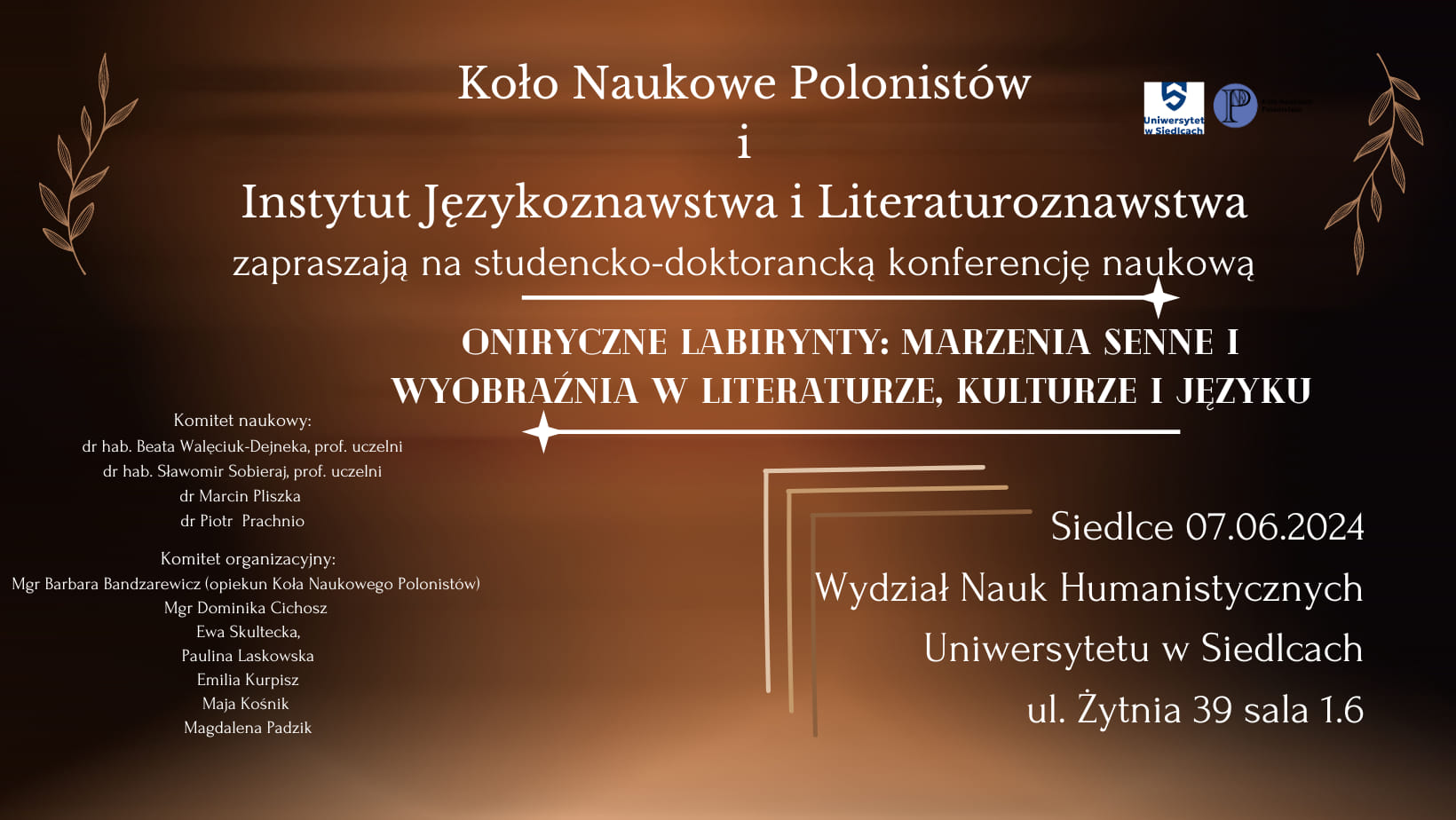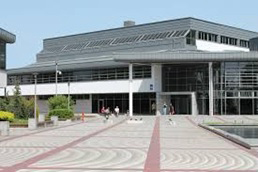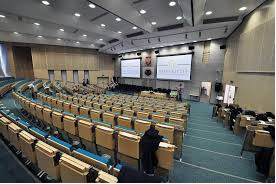
WWW (Orcid) https://orcid.org/0000-0002-8883-3175
Wydział Nauk Humanistycznych/ Instytut Językoznawstwa i Literaturoznawstwa
ZAINTERESOWANIA NAUKOWE
Glottodydaktyka, kształcenie nauczycieli języków obcych, polityka językowa, wielojęzyczność.
WYKSZTAŁCENIE I KWALIFIKACJE
2007 – licencjat, Filologia Angielska
2009 – magister, Filologia Angielska
2016 – doktor nauk humanistycznych, językoznawstwo angielskie
Rozprawa doktorska: European Language Policy and its Implications for Language Teacher Education in the Academic Context napisana pod kierunkiem prof. zw. dr hab. Hanny Komorowskiej, Uniwersytet Warszawski, Instytut Anglistyki, 2016.
WYKAZ PUBLIKACJI
Cybulska-Gómez de Celis, K. Towards a Competent Negotiator in the Intercultural Context. Discourses on Culture 14, 2020, University of Social Sciences, 9-28
Cybulska-Gómez de Celis, K. & Bednarek, D. Review of Wilfred J. Zerbe, Charmine E. J. Härtel, Neal M. Ashkanasy, & Laura Petitta. Emotions and Identity: Vol. 13 (Research on Emotion in Organizations). Discourses on Culture 14, 2020, University of Social Sciences, 157-168
Cybulska K. & Kabalin Borenić V. EFL teacher trainees and European goals of multilingualism and plurilingualism. A survey of attitudes in Poland and Croatia, w: Teaching and learning in multilingual contexts: sociolinguistic and educational perspectives / Otwinowska-Kasztelanic Agnieszka, De Angelis Jessica (red.), Teaching and learning in multilingual contexts: sociolinguistic and educational perspectives, 2014, Multilingual Matters, 75-97
Cybulska K. In Search for Quality Language Teacher Education in the Polish Context: Attitudes and Multilingualism, w: Teacher of the 21st century: Quality teaching for Quality education / Linda Daniela (red.), 2014, Cambridge Scholars Publishing, 162-176
Cybulska K. Book Review of Issues in Promoting Multilingualism. Teaching – Learning – Assessment, w: Linguarum Arena: revista do Programa Doutoral em Didática de Línguas da Universidade do Porto. / da Graça L. Castro Pinto Maria (red.), Linguarum Arena 3, 2012, Universidade do Porto, 143-146
Cybulska K. Developing Individual Multilingualism in Higher Education: Prospects and Dilemmas, w: Verbum / Melnikienė Danguolė (red.), Verbum. Mokslo darbai 2, 2011, Vilnius university, 73-83
Cybulska K. & Kabalin Borenić, V. Learning Another Language and Motivation to Continue Learning English: Competition or Synergy? w: Horváth, J. (ed) UPRT 2011: Empirical Studies in English Applied Linguistics, 2011, Lingua Franca Csoport, 147-159
Cybulska K. Seventh International Conference on Third Language Acquisition and Multilingualism. Book of Abstracts, 2011, Uniwersytet Warszawski, ISBN 978-83-60269-22-X, 76 s.
Cybulska K. Between Plurilingualism and Intercomprehension: A strategy for linguistic diversity and communication in Europe., w: Coping with Diversity: Language and Culture Education. / Komorowska Hanna, Aleksandrowicz-Pędich Lucyna (red.), Coping with Diversity: Language and Culture Education, 2010, ACADEMICA WYDAWNICTWO SWPS, 29-40
Cybulska K. O interdyscyplinarności na lektoratach języka obcego w szkolnictwie wyższym - możliwości i proponowane rozwiązania, w: Interdyscyplinarność w nauczaniu języków obcych. / Kuźmińska Romualda (red.), Prace Naukowe SJO Politechniki Wrocławskiej 40, nr 7, 2010, Oficyna Wydawnicza Politechniki Wrocławskiej, 66-71
Cybulska K. Różnojęzyczność a kształcenie językowe w szkolnictwie wyższym, w: Kształcenie językowe w szkolnictwie wyższym / Komorowska Hanna (red.), Kształcenie językowe w szkolnictwie wyższym, 2009, ACADEMICA WYDAWNICTWO SWPS, 97-114

Logo tekstu łatwego do czytania i rozumienia: głowa nad otwartą książką
i podniesiony w górę kciuk w geście OK.
www.youtube.com/watch?v=oaX2NA8xxh8
Instytut Językoznawstwa i Literaturoznawstwa, zwany dalej Instytutem, znajduje się w budynku Wydziału Nauk Humanistycznych przy ulicy Żytniej 39 w Siedlcach, obok budynku Biblioteki Głównej.
Budynek Wydziału Nauk Humanistycznych jest dostępny dla osób z niepełnosprawnościami.

Tutaj jest budynek, w którym jest Instytut.

Tutaj też są sale wykładowe.
Sekretariat Instytutu jest na trzecim piętrze w pokoju 3.41.
Dyrektorem Instytutu jest dr hab. Sławomir Sobieraj, profesor uczelni.
Co można studiować w Instytucie?
W Instytucie można studiować na kierunkach:
- filologia/filologia angielska, studia stacjonarne i niestacjonarne I i II stopnia
- filologia polska, studia stacjonarne I i II stopnia
- logopedia z audiologią, studia stacjonarne I stopnia
- logopedia, studia stacjonarne II stopnia
Studenci studiów stacjonarnych i niestacjonarnych na kierunku filologia/filologia angielska mogą studiować na jednej z poniższych specjalności:
- język angielski w biznesie z translatoryką (studia I i II stopnia)
- filologia angielska z uprawnieniami nauczycielskimi/nauczycielska (studia I i II stopnia)
- języki obce w zarządzaniu i logistyce (studia I stopnia)
Studenci studiów stacjonarnych na kierunku filologia polska mogą studiować na jednej z poniższych specjalności:
- specjalność nauczycielska (studia I i II stopnia)
- kreatywne pisanie i edycje cyfrowe (studia I stopnia)
- kreatywne pisanie i copywriting (studia II stopnia)
Jakie badania prowadzi Instytut?
W Instytucie prowadzone są badania z zakresu:
- literaturoznawstwa (teorii i historii literatury polskiej, angielskiej, rosyjskiej, niemieckiej i innych)
- językoznawstwa (językoznawstwo ogólne, porównawcze, kognitywne)
Jakie czasopisma są afiliowane przy Instytucie?
Przy Instytucie afiliowane są:
- “Forum For Contemporary Issues In Language And Literature”
- “Conversatoria Litteraria”
- “Conversatoria Linguistica”
- “Głos Studencki”
Jakie konferencje organizuje Instytut?
Instytut organizuje coroczne międzynarodowe konferencje naukowe:
- Annual Siedlce Forum for Contemporary Issues in Language and Literature, których współorganizatorem jest Uniwersytet Wysp Balearskich
- Conversatoria Litteraria, których współorganizatorem jest Uniwersytet Mateja Bela w Bańskiej Bystrzycy.
Żeby załatwić sprawy w Instytucie można:
- napisać pismo i wysłać je na adres: Instytut Językoznawstwa i Literaturoznawstwa, ul. Żytnia 39, 08-110 Siedlce,
- przynieść pismo do Sekretariatu Instytutu do pokoju 3.41,
- napisać wiadomość i wysłać ją na adres e-mailowy: Ten adres pocztowy jest chroniony przed spamowaniem. Aby go zobaczyć, konieczne jest włączenie w przeglądarce obsługi JavaScript. lub zadzwonić pod numer 25 643-18-71 lub 25 643-18-82
- przyjść do Instytutu i spotkać się z pracownikiem w godzinach pracy Instytutu. Sekretariat Instytutu czynny jest od poniedziałku do piątku od 7:30 do 15:30.
LOGOPEDIA - STUDIUJ U NAS!
Jeżeli chcesz zdobyć:
- obszerną, interdyscyplinarną wiedzę o zaburzeniach mowy i języka,
- umiejętności praktyczne, które przygotują do pracy z dziećmi, młodzieżą, dorosłymi i osobami w podeszłym wieku z różnymi wadami mowy i słuchu,
- doświadczenia zawodowe, które ułatwią znalezienie pracy na stanowisku logopedy, nauczyciela logopedy,
to studiuj u nas logopedię!!!
OFERUJEMY:
I. LOGOPEDIA Z AUDIOLOGIĄ
STUDIA I STOPNIA STACJONARNE /profil praktyczny/
- Zdobędziesz wiedzę teoretyczną obejmującą zagadnienia związane z największymi fenomenami ludzkiego umysłu – mową i językiem.
- Przedmioty praktyczne pozwolą Ci na zdobycie umiejętności diagnozowania zaburzeń mowy, słuchu i głosu oraz stosowania procedur programowania i prowadzenia terapii logopedycznej.
- Zdobędziesz tytuł zawodowy logopedy szkolnego z dodatkowymi umiejętnościami w zakresie audiologii - nowość na rynku pracy!
- Będziesz mógł podjąć pracę w placówkach logopedycznych resortu oświaty i zdrowia.
- Moduł psychologiczno-pedagogiczny przygotuje Cię do wykonywania zawodu nauczyciela.
II. LOGOPEDIA
STUDIA II STOPNIA STACJONARNE /profil praktyczny/
- Zdobędziesz pogłębioną wiedzę na temat zachowań językowych, zaburzeń mowy i słuchu, centralnych zaburzeń przetwarzania słuchowego, metodologii badań logopedycznych.
- Masz możliwość wyboru specjalności neurologopedycznej (!) lub gerontologopedycznej (!), które umożliwią Ci zdobycie umiejętności najbardziej poszukiwanych na rynku pracy.
- Jeśli zechcesz, poprowadzisz terapię logopedyczną pod kierunkiem doświadczonych logopedów w Studenckiej Poradni Logopedycznej.
- Zdobędziesz pełne uprawnienia do wykonywania zawodu logopedy. Będziesz mógł podjąć pracę we wszystkich placówkach logopedycznych resortu oświaty i resortu zdrowia, w mediach, a także prowadzić prywatny gabinet logopedyczny.
- Moduł psychologiczno-pedagogiczny przygotuje Cię do wykonywania zawodu nauczyciela.
On the 5th of November 2020 Siedlce University of Natural Sciences and Humanities hosted the Fifth Edition of the International Conference: the Annual Siedlce Forum for Contemporary Issues in Language and Literature. Between clarity and fuzziness: Investigating the concept of meaning in linguistic, literary and philosophical contexts. This year’s event was organized in cooperation with the University of the Balearic Islands (Universitat de les Illes Balears) and was devoted to the problem of meaning and the associated questions of clarity as well as the haziness of messages transmitted via texts created in the fields of literary and cultural studies, linguistics and philosophy.
After the conference was formally opened by professor Edward Colerick (UPH) and professor Ruben Jarazo (UIB), professor Anna Malicka-Kleparska from the Catholic University of Lublin delivered the plenary lecture entitled: “Kimian states vs. Davidsonian states”. The lecture was followed by a presentation entitled “My Tongue Swore to, but my Heart Did Not: Must I Mean What I Say?” prepared by professor David Perez Chico from the University of Zaragoza.
During the panel sessions, speakers discussed problematic issues concerning the clarity/fuzziness of messages conveyed both in the sphere of current political events, TV commercials, as well as in reference to the phenomenon of manipulation. A particularly intriguing issue discussed was that of humour in public language. Some presentations focused on questions covering the field of linguistics – both from the theoretical, as well as the empirical perspective. Traditionally, one of the panel sessions was devoted to discussing the main theme of the conference from a philosophical point of view. The problem addressed during this year’s conference was complemented with literary studies presentations which, among others, touched on the rich relationship between philosophy and literature.
The conference provided scholars with a possibility to deliver and listen to a variety of lectures within an interdisciplinary approach, which allowed the two leading conference areas—literature and linguistics— to be combined with such diverse and fascinating fields as history, philosophy and media studies. It additionally proved to be a perfect opportunity to exchange ideas and research results – both on the national, as well as international level. The participants of the conference represented important Polish academic centres (University of Silesia in Katowice, University of Zielona Góra, University of Białystok, Jagiellonian University, Adam Mickiewicz University in Poznań, Kazimierz Wielki University in Bydgoszcz) as well as foreign academic centres: University of the Balearic Islands, University of La Laguna, University of Zaragoza, Sapienza University of Rome, and the University of Oslo.
We would very much like to thank all of our speakers for the lectures they delivered and for sharing the results of their fascinating research.



